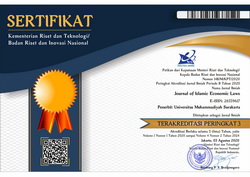Positive Effect of Attitude, Peer Influence, and Knowledge Zakat on Zakat Compliance Behavior: Update in Covid 19
DOI:
https://doi.org/10.23917/jisel.v4i2.13859Keywords:
Theory Planned Behaviour component, Intention, Compliance Behaviour to Pay Zakat on Profession, Covid-19Abstract
This study aims to analyze the influence of the components of the Theory of Planned Behavior, which consists of positive attitude, peer influence, and zakat knowledge on the compliance behavior of paying zakat profession with the intention to pay zakat as an intervening variable update case in covid 19. This research is a quantitative study using the Partial Least Square-Structural Equation Modeling (PLS-SEM) technique. The sample used is 100 respondents based on the calculation of the Slovin formula with 129 respondents of zakat profession payers (muzakki) in Indonesia. Empirical findings indicate that a positive attitude and zakat knowledge positively and significantly affect the intention to pay zakat. The intention to pay zakat has a significant positive effect on the compliance behavior of paying zakat profession even during covid 19. Meanwhile, peer influence has no significant impact on the intention to pay zakat due to the Covid 19 era. Policymakers need to pay more attention to the factors that have been identified in this study as essential factors to become a reference in developing strategies to increase zakat collection. Zakat is one of potential Islamic social fund to eradicate poverty as impact of the Covid 19 pandemic.
Downloads
Downloads
Submitted
Published
How to Cite
Issue
Section
License
Copyright (c) 2021 Journal of Islamic Economic Laws

This work is licensed under a Creative Commons Attribution-ShareAlike 4.0 International License.



















